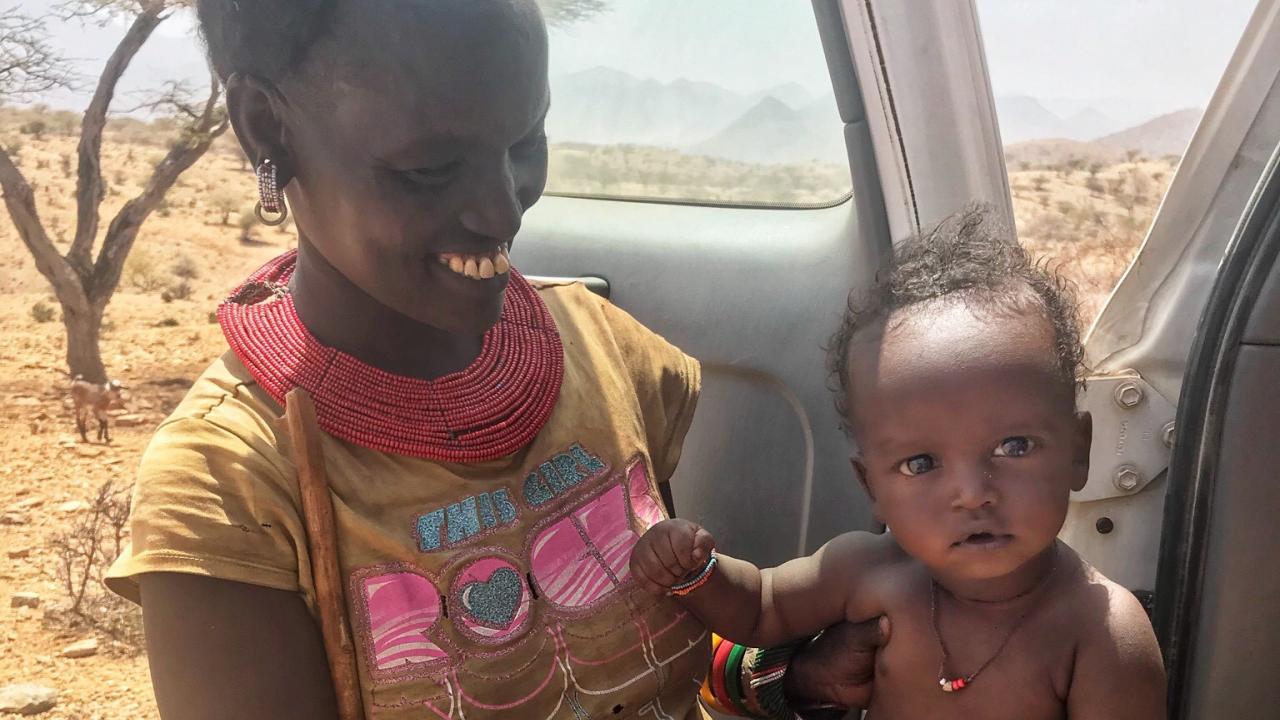
A Research Collaboration in Kenya Seeks Durable Empowerment for Women
Poverty graduation programs, which transfer assets and skills, can set women on a path toward higher income and greater empowerment at home, but in the arid rural parts of northern Kenya drought can force them to liquidate their gains so the family can survive.
The AMA Innovation Lab just completed the baseline survey for a five-year project in Samburu County, Kenya that combines a successful graduation program for women in ultra-poverty with index-based livestock insurance to test whether the two together can provide a stable income and durable empowerment in spite of drought.
“Empowerment can be a tenuous achievement when there’s drought,” says Michael Carter, a UC Davis professor of agricultural and resource economics and a principal investigator on the project. “Insurance might help women to hold onto gains in income and empowerment while also helping them to avoid coping strategies that can sacrifice their family’s future wellbeing.”
Empowering Women in Samburu County, Kenya
Samburu County is a remote and arid rural area just over 200 miles north of Nairobi. About 92 percent of Samburu County’s agricultural land is categorized as low potential, leaving households there reliant on livestock. An estimated 71 percent of people in Samburu lived in poverty in 2016, which is significantly higher than Kenya’s national poverty rate of 45.2 percent.
In Samburu, The BOMA Project resilience-building graduation program provides women with cash transfers, training and mentorship to start a business and build savings. Women-owned businesses mean more than just higher incomes and greater resources at home. They can also lead women to have a stronger voice in household decisions, allowing them to advocate for themselves and their children.
“Women and children disproportionately bear the burden of the cascading effects of extreme poverty,” says Kathleen Colson, founder and CEO of The BOMA Project. “Empowering women, giving them the tools to forge a pathway out of extreme poverty, can solve one of the biggest global challenges facing us this century.”
Supporting Income and Empowerment Despite Drought
Seven droughts struck Kenya between 1992 and 2012. Families in arid Samburu are especially vulnerable to the impacts of drought. In March, The Standard reported on a survey that found over 20,000 children under the age of 15 are suffering from malnutrition and stunted growth.
“We know that programs like The BOMA Project empower women, but in areas at a high risk of drought those hard-won gains are vulnerable to collapse,” says Carter. “Insurance could be one way for women to secure a more lasting empowerment.”
Carter’s project in Samburu will pair The BOMA Project’s graduation program with index-based livestock insurance (IBLI) from the International Livestock Research Institute (ILRI). Like the businesses these women start, the insurance will also be in their name, with any payouts going directly to them. Keeping resources under control of women should help them to maintain both the income they generate and empowerment in the home.
The IBLI program was established in 2010 by Andrew Mude, an ILRI economist and a co-principal investigator on the AMA Innovation Lab study on The BOMA Project with Carter. IBLI has had a real impact on Kenyan pastoralists in Marsabit County, which is just east of Samburu. A 2013 study found insured households were 36 percent less likely than the non-insured to sell their livestock as a way to cope. Insured households were also 25 percent less likely to reduce their meals than non-insured households.
How Insurance Could Support Women's Empowerment
The AMA Innovation Lab project measures empowerment in two ways. First, the household surveys focus on women’s participation in household decisions and whether they control their own assets. The survey is adapted from the Women’s Empowerment in Agriculture Index (WEAI), developed in 2013 by the International Food Policy Research Institute (IFPRI), the Oxford Poverty and Human Development Initiative and USAID.
Second, the research team will measure any change in the kinds of decisions the treated households make. These changes could provide evidence that women are playing a greater role in those decisions, which is an indication of empowerment.
“They might buy more insurance or they might decide to buy camels or goats, which can both stay close to home, instead of cows which need to move to new areas frequently to find grass to eat,” says Andrew Hobbs, a Ph.D. candidate in agricultural and resource economics at UC Davis who spent two weeks in Samburu in February, 2018 to help conduct the study’s baseline survey.
The decision to buy camels or goats instead of cattle are one example on how taking part in household decisions can make a difference. If a household has mainly cattle, the men could end up herding them far away in search of forage for most of the year. In these circumstances, even if the men want to help their families, they might have no means to affordably send whatever money they have.
“Women are the ones who see that their kids are hungry or need to have their school fees paid,” says Hobbs.
This report is made possible by the generous support of the American people through the United States Agency for International Development (USAID) cooperative agreement 7200AA19LE00004. The contents are the responsibility of the Feed the Future Innovation Lab for Markets, Risk and Resilience and do not necessarily reflect the views of USAID or the United States Government.
This work was conducted as part of the CGIAR Research Program on Livestock and was supported by contributors to the CGIAR Trust Fund.
